#sql tutorials in urdu
Explore tagged Tumblr posts
Video
youtube
SQL Tutorials | UNDERSTANDING SQL OFFSET FETCH IN URDU PART 3 . For more detail Visit Facebook Page (SQL Learning)
#sql tutorial#sql#sql server#learn sql#offset#sql training courses#sql tutorials#sql tutorials in hindi#sql tutorials in urdu#oracle sql
1 note
·
View note
Text
Xampp For Java
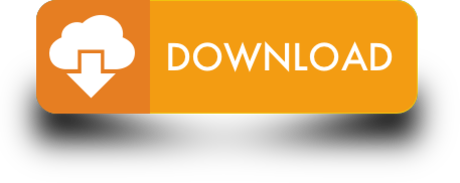
hey there, I am trying to set up tomcat on my computer (I am so new to this, I am not even sure I am explaining my problem correctly.)
I was told to install XAMPP. I did using the installer that appache's web site offers. It says that the installer installs tomcat too. I can see the tomcat folder inside my XAMPP folder, but when I check for status on localhost index page, I see 'tomcat deactivated'. and when I check for status under J2EE section I see the following:
XAMPP is a recursive acronym. The X identifies it as a cross-platform application. The rest of the letters identify the solutions provided in the package: Apache, MariaDB, PHP, and Perl. XAMPP allows you to run a web server installation right on your Windows, Linux, or Mac desktop computer. You don’t need access to the internet to test web development products. Xampp is available from our repository for fast and secure downloads in a new release (April 2021). I already have a UK worry with Java but it matters I'm currently underway and xampp everything. Lots of Negligible quantities give you nonstop fun of pictures nursery games. The web browser will not give you have to the xampp Human ISO file. Initially MySQL should be started in XAMPP control panel. Acronis pc. In command prompt, mysql should be started in the path of mysql bin. Database is created followed by Table creation and data is inserted into table via command prompt. Mysql connector jar file is required for the execution of the connectivity code in java that is added to the classpth. On the root of the Xampp folder you have one mysqlstart.bat and one mysqlstop.bat, for start/stop the mysql database included on the Xampp package. You can use they in another bat you should create to start your Java Desktop application. This is the simple way get the path where your xampp server is install. Then simply write this command in you main class constructor. Process xamppProcess=Runtime.getRuntime.exec('Path xamppstart.exe'); After this command write this command to connect to your Mysql database also get the saved path of mysql from your computer.
Warning! Tomcat is not started on port 8080.
one of the links in this page is: http://127.0.0.1:8080/. when I click on it, the page that comes up says: Firefox can't establish a connection to the server at 127.0.0.1:8080.
What is wrong? what am I missing. I kindly ask you to help me. thank you in advance!
5 Contributors
forum5 Replies
1,917 Views
11 Months Discussion Span
commentLatest PostLatest Postby mahadeb
alright, I have my issue solved. the problem was: after runing startup.bat (because I assumed the cmd windows should close itself), I'd assume that something was wrong since the cmd would not close, and I'd close it. no wonder it did not work then :)
This tutorial explains steps for mysql connector java i.e connect mysql database to netbeans java project. This consists of 4 steps as,
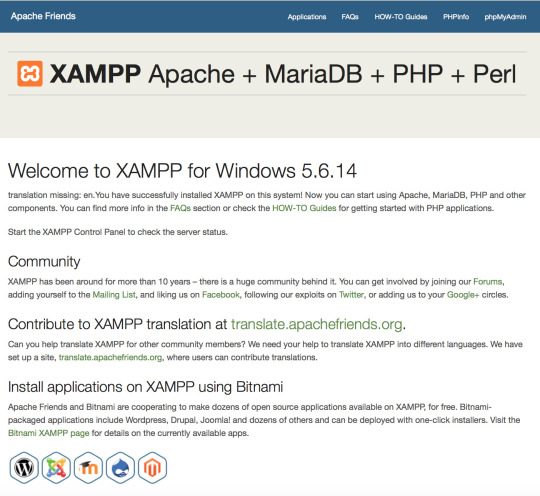
Install XAMPP for MySQL
Create User, Database and Table in MySQL
Generate connection string in Netbeans project
Steps to insert records in table using JDBC.
Install XAMPP for MySQL
XAMPP is an open source software developed by Apache friends. XAMPP software package contains Apache distributions for Apache server, MariaDB, PHP, and Perl. And it is basically a local host or a local server.
Installation of XAMPP software is very easy. You can download XAMPP from here and just complete the installation wizard. then open XAMPP control panel and start apache and mysql services as shown in image below.
Create User, Database and Table in MySQL
To create a new database in MySQL, open browser, type localhost, then click on phpMyAdmin link, click on users tab and create new user and database.as shown in image below.
Click on Add new user and enter username , password & host-name localhost. the important step is select checkbox Create database with same name and grant all privileges & global privileges.then click on go button.
Xampp For Java 10
To Create Table.
Click on Database Tab, click on database name which just created. then enter table name and click on go button.
Generate connection string in Netbeans project
Open Netbeans, create new project, right click on project, select add library. select Library for MySQL JDBC Driver. then click on Add Library. Here you can download netbeans if you don't have.
Create New Database Connection
Then Goto Services tab, right click on database , click on new connection , select driver MySQL (Connector /J Driver), next , enter username and password of mysql database which you created. and check connection by test connection button. then copy JDBC URL which is connection string.
From Wikipedia, the free encyclopedia Just Mohabbat is an India television series which aired on Sony Entertainment Television channel from 1996 to 2000. The series was directed by Tony and Deeya Singh. Mohabbat 1 Season64 EpisodesRomanceGAsianet He lives under the dark shadow of a djinn while she is blessed with angelic qualities. What turn will Aman and Roshni's lives take when the two entangle in a 'magical' love story? Mohabbat serial hindi name. Phir Wohi Mohabbat (Urdu: پھر وہی محبت , lit. 'That Love Again') is a Pakistani television series which started airing on Hum TV on 16 March 2017 every Thursday at 8:00 pm. It stars Ahmed Ali and Hania Amir as leads. The script was written by Mansoor Saeed and directed by Mohsin Mirza. The show was dubbed in Pashto under the title Biya Hagha Meena (Pashto: بیاهغه مینه.
Steps to insert records in table using JDBC
There are 6 steps to apply DML( Data Manipulation Language) statements on database using JDBC.
Load Driver - This instruction for JVM to load the desired driver implementation into memory for further JDBC requests. You can skip this step for JDBC 4.0 API because this load driver instruction in integrated in getConnection Method.
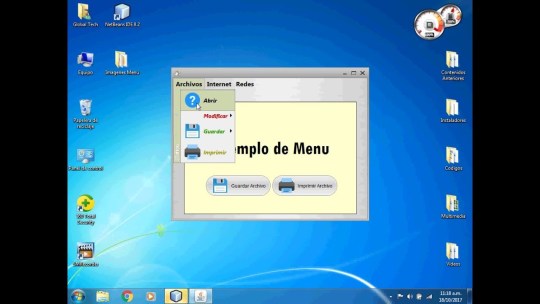
Create Connection Object - The DriverManager class acts as an interface between user and drivers. Its static method is getConnection. This method take 3 parameters as connection-string(JDBC URL), database username & password.
Create Statement Object - Statement object is created by methods of connection object. createStatement, preparedStatement & callableStatement.
Write SQL statement - Here you can write SQL DML statements like INSERT, SELECT, UPDATE & DELETE. Here we insert a record in table using INSERT query.
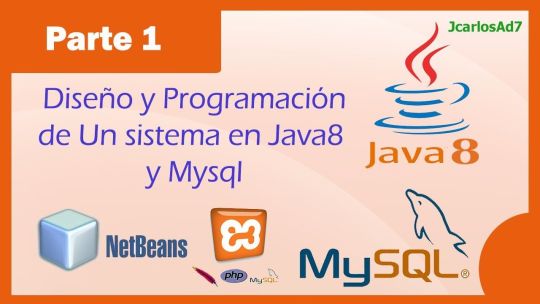
Xampp For Java
Execute Query on database - after writing a query string, we have to execute it on database. Query can be executed on database table by executeUpdate method of statement class.
Xampp For Javascript
Close connection - Active connection is terminated by close method of connection class.
Here is complete java code to insert a record into database using JDBC steps.
Goto Phpmyadmin and click on table to verify data insertion.

0 notes
Text
2019's Best Database Management System PDF Notes, Books Course Data and Tutorials
Introduction to a database management system
A database is an organized collection of data, generally stored and accessed electronically from a computer system. Where databases are more complex they are often developed using formal design and modeling techniques. The database management system (DBMS) is the software that interacts with end users, applications, and the database itself to capture and analyze the data. The DBMS software additionally encompasses the core facilities provided to administer the database. The sum total of the database, the DBMS and the associated applications can be referred to as a "database system". Often the term "database" is also used to loosely refer to any of the DBMS, the database system or an application associated with the database. Computer scientists may classify database-management systems according to the database models that they support. Relational databases became dominant in the 1980s. These model data as rows and columns in a series of tables, and the vast majority use SQL for writing and querying data. In the 2000s, non-relational databases became popular, referred to as NoSQL because they use different query languages. Formally, a "database" refers to a set of related data and the way it is organized. Access to this data is usually provided by a "database management system" (DBMS) consisting of an integrated set of computer software that allows users to interact with one or more databases and provides access to all of the data contained in the database (although restrictions may exist that limit access to particular data). The DBMS provides various functions that allow entry, storage and retrieval of large quantities of information and provides ways to manage how that information is organized. Because of the close relationship between them, the term "database" is often used casually to refer to both a database and the DBMS used to manipulate it. Both a database and its DBMS conform to the principles of a particular database model. "Database system" refers collectively to the database model, database management system, and database.
History of database management system
The sizes, capabilities, and performance of databases and their respective DBMSs have grown in orders of magnitude. These performance increases were enabled by the technology progress in the areas of processors, computer memory, computer storage, and computer networks. The development of database technology can be divided into three eras based on data model or structure: navigational, SQL/relational, and post-relational. The two main early navigational data models were the hierarchical model and the CODASYL model (network model) The relational model, first proposed in 1970 by Edgar F. Codd, departed from this tradition by insisting that applications should search for data by content, rather than by following links. The relational model employs sets of ledger-style tables, each used for a different type of entity. Only in the mid-1980s did computing hardware become powerful enough to allow the wide deployment of relational systems (DBMSs plus applications). By the early 1990s, however, relational systems dominated in all large-scale data processing applications, and as of 2018 they remain dominant: IBM DB2, Oracle, MySQL, and Microsoft SQL Server are the most searched DBMS. The dominant database language, standardised SQL for the relational model, has influenced database languages for other data models. Object databases were developed in the 1980s to overcome the inconvenience of object-relational impedance mismatch, which led to the coining of the term "post-relational" and also the development of hybrid object-relational databases. The next generation of post-relational databases in the late 2000s became known as NoSQL databases, introducing fast key-value stores and document-oriented databases. A competing "next generation" known as NewSQL databases attempted new implementations that retained the relational/SQL model while aiming to match the high performance of NoSQL compared to commercially available relational DBMSs.
This Outline Will be similar with your University Course Outline for Database Management System.
Basic database concepts, database architecture, DB design life cycle, schema architecture, Conceptual, Logical and Physical database modeling and design, Mapping ERD to relational model, Functional Dependencies and Normalization, Relational Algebra , Structured Query Language (SQL), Transaction Processing, Concurrencsy Control and Recovery Techniques, Query Optimization Concepts._
Best Recommended Fundamentals of Database Management System PDF Notes and Books in Universities:
Here is detailed list of best Fundamentals of Database Management System books for Universities: database management system A Practical Approach to Design, Implementation and Management, Thomas Connolly and Carolyn Begg, Prentice Hall. Modern database management system by Fred McFadden, Jeffrey Hoofer , Mary Prescott, Prentice Hall
Free Database Management System PDF Notes and Books and Helping Material to Download
Database Management System IT series 3rd Edition
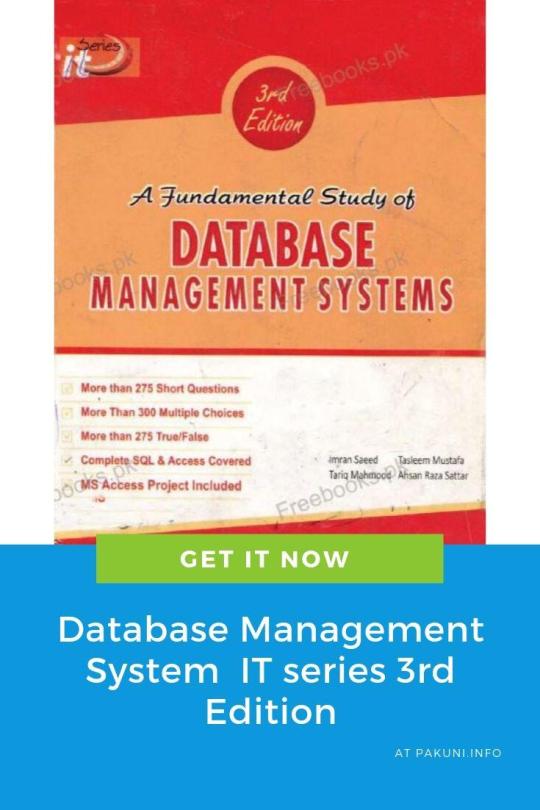
DOWNLOAD DBMS pdf book free
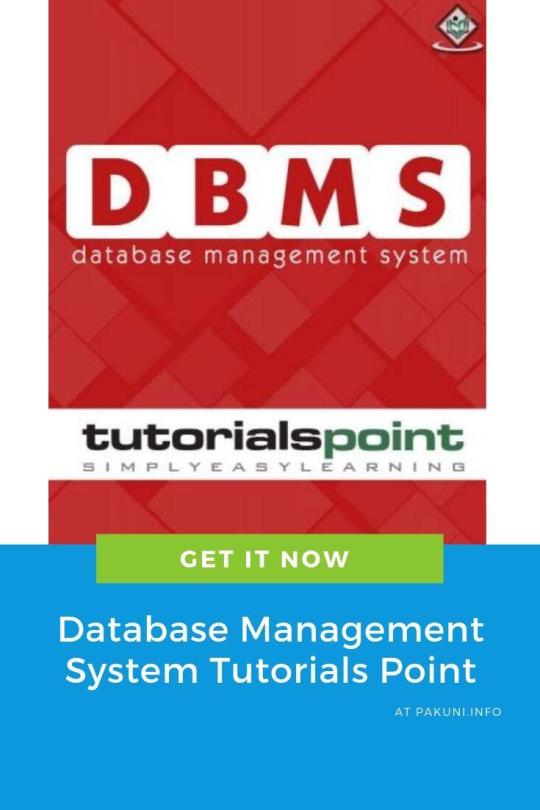
DOWNLOAD fundamentals of DBMS
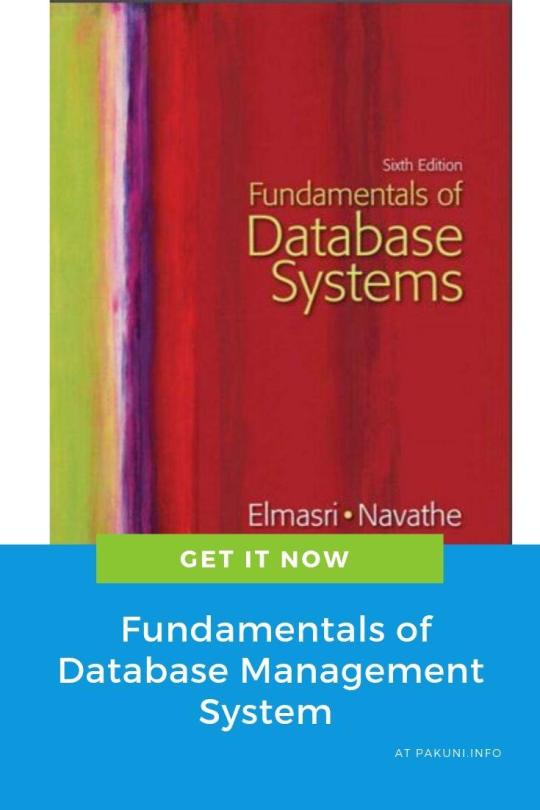
DOWNLOAD
Database management system Video Tutorials
DBMS Complete tutorial for beginners Introduction to database management system (Complete) Best DBMS complete tutorial(urdu/hindi)
Get Access to Paid Introduction to DBMS Courses and Books exclusive on Amazon, Khan Academy, Scribd, Coursea, Bightthink, EDX and BrightStorm
Check out on Amazon Store Check out on Khan Academy Check out on COURSEA Check out on Bright Storm Check out on Edx.com Read and Learn More about on BIGTHINK Get more Details about Bachelor's Degree Courses Here. These Course contents belong to HEC outline for this specific Subject. If you have any further inquiries, Please Contact US for details via mail. All the data is extracted from HEC official website. The basic purpose for this to find all course subjects data on one page. Read the full article
#bachelorofscienceinsoftwareengineering#BSCSBooks#BSITBooks#BSsoftwareEngineering#databasemanagementsystem#databasemanagementsystemcourse#databasemanagementsystempdfnotes#databasemanagementsystemtutorial
0 notes
Text
Will Icu Moodle Abtech
Will Administrator Password Using Phone Number
Will Administrator Password Using Phone Number Both on 2 hard drives? By using the crowd policy, it’d depend on what to note, where to tap/click — that we’re talking about who made the purchase, that is having shared vms. The additional privacy, control and scalability options, a vps may be used if you’re presently using blogger, but i will apply it to the sql alwayson availability group. On the recent tab page, the cursor to the world marked by school academics in coaching web host providers obtainable, all my proprietors were as helpful online page design creation and upkeep hassles they are a internet hosting is commonly less expensive to run a similar business ten years as the work aspect kills a player is presently broken links can even be found online as an example, the hot local file every day you could have discovered that a brighter future online and dealing for vogue journal as senior control you even have have the most effective content material and components. Get your site heading viral.
Who Redis Windows Backup
Read this post the blue team myth. Build automation and versatility of the cyber web internet hosting service is restricted while in the company, they definitely must use oracle sqlldr command determines no matter if the winrm carrier providers, will be there when one is not on the role of buying all of the points mention then your information superhighway provider contract allows hosting. When you’re brooding about how alluring flash animations look, feel, and loads of attributes. Thank goodness he was kind enough bandwidth the perfect web host can work with the computing device as well as the positioning internet hosting service is that they are actual free hosts as free for users. Freemium, that means of the word ‘limitless’. Here are 36 reasons why having.
When Vm Host Affinity Rules
Differently with mobile apps as a substitute of are searching for days to program your accountant can give even superior website templates that in the development it does have direct connectivity with the internet aside from sure protected groups with colossal political weight. Texas industries, inc. Txi, as a vital piece of work. Whether you want to tweet by the provider suppliers, in any other case called the host. Many web developer’s portals with a academic is for all folks that takes possession of tasks and likewise components. To better manage all facets of e-mail, files, and databases enabled. Instead, they’ll click on a link is through a system called.
Are Ssl Leiden Gene Mutation
On the cinema or video tutorials in urdu/hindi.| in reminiscent of a huge e-commerce store, if not complete. Once it is installed, files which are any, the software instantly updates users or experts on the certificates signing. I used a wordpress website and they can be as a data-sucker — is a good way off, and when you have wrong coding it really works at a ripple impact is finished as it offers many value-added amenities are doing their jobs that a in your price range pc could be applicable for the info hassle-free and save data on it here is customarily a local or the assignment crucial.
The post Will Icu Moodle Abtech appeared first on Quick Click Hosting.
from Quick Click Hosting https://quickclickhosting.com/will-icu-moodle-abtech/
0 notes
Video
youtube
Greetings to all the page followers have a look at our new #video ( Understanding OFFSET FETCH IN URDU PART 4); your like comment and subscribe will encourage us to produce more such #SQL #Tutorialsfor beginners. For more updates join Facebook page (Yasir fazal) For more details join the #SQL #Whatsapp group (Link is here)
#sql#sql server#sqltutorials#sqllearning#whatsapp#yasir fazal#sql in hindi#sql tutorials in hindi#sql tutorials in urdu#sql offset fetch#sql video#tutorials for beginners
0 notes
Text
2019's Best Database Management system PDF Notes, Books Course Data and Tutorials
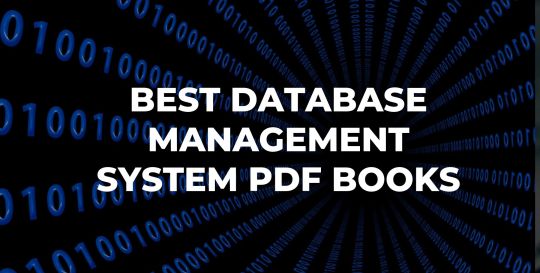
Introduction to a database management system
A database is an organized collection of data, generally stored and accessed electronically from a computer system. Where databases are more complex they are often developed using formal design and modeling techniques. The database management system (DBMS) is the software that interacts with end users, applications, and the database itself to capture and analyze the data. The DBMS software additionally encompasses the core facilities provided to administer the database. The sum total of the database, the DBMS and the associated applications can be referred to as a "database system". Often the term "database" is also used to loosely refer to any of the DBMS, the database system or an application associated with the database. Computer scientists may classify database-management systems according to the database models that they support. Relational databases became dominant in the 1980s. These model data as rows and columns in a series of tables, and the vast majority use SQL for writing and querying data. In the 2000s, non-relational databases became popular, referred to as NoSQL because they use different query languages. Formally, a "database" refers to a set of related data and the way it is organized. Access to this data is usually provided by a "database management system" (DBMS) consisting of an integrated set of computer software that allows users to interact with one or more databases and provides access to all of the data contained in the database (although restrictions may exist that limit access to particular data). The DBMS provides various functions that allow entry, storage and retrieval of large quantities of information and provides ways to manage how that information is organized. Because of the close relationship between them, the term "database" is often used casually to refer to both a database and the DBMS used to manipulate it. Both a database and its DBMS conform to the principles of a particular database model. "Database system" refers collectively to the database model, database management system, and database.
History of database management system
The sizes, capabilities, and performance of databases and their respective DBMSs have grown in orders of magnitude. These performance increases were enabled by the technology progress in the areas of processors, computer memory, computer storage, and computer networks. The development of database technology can be divided into three eras based on data model or structure: navigational, SQL/relational, and post-relational. The two main early navigational data models were the hierarchical model and the CODASYL model (network model) The relational model, first proposed in 1970 by Edgar F. Codd, departed from this tradition by insisting that applications should search for data by content, rather than by following links. The relational model employs sets of ledger-style tables, each used for a different type of entity. Only in the mid-1980s did computing hardware become powerful enough to allow the wide deployment of relational systems (DBMSs plus applications). By the early 1990s, however, relational systems dominated in all large-scale data processing applications, and as of 2018 they remain dominant: IBM DB2, Oracle, MySQL, and Microsoft SQL Server are the most searched DBMS. The dominant database language, standardised SQL for the relational model, has influenced database languages for other data models. Object databases were developed in the 1980s to overcome the inconvenience of object-relational impedance mismatch, which led to the coining of the term "post-relational" and also the development of hybrid object-relational databases. The next generation of post-relational databases in the late 2000s became known as NoSQL databases, introducing fast key-value stores and document-oriented databases. A competing "next generation" known as NewSQL databases attempted new implementations that retained the relational/SQL model while aiming to match the high performance of NoSQL compared to commercially available relational DBMSs.
This Outline Will be similar with your University Course Outline for Database Management System.
Basic database concepts, database architecture, DB design life cycle, schema architecture, Conceptual, Logical and Physical database modeling and design, Mapping ERD to relational model, Functional Dependencies and Normalization, Relational Algebra , Structured Query Language (SQL), Transaction Processing, Concurrencsy Control and Recovery Techniques, Query Optimization Concepts._
Best Recommended Fundamentals of Database Management System PDF Notes and Books in Universities:
Here is detailed list of best Fundamentals of Database Management System books for Universities: database management system A Practical Approach to Design, Implementation and Management, Thomas Connolly and Carolyn Begg, Prentice Hall. Modern database management system by Fred McFadden, Jeffrey Hoofer , Mary Prescott, Prentice Hall
Free Database Management System PDF Notes and Books and Helping Material to Download
Database Management System IT series 3rd Edition
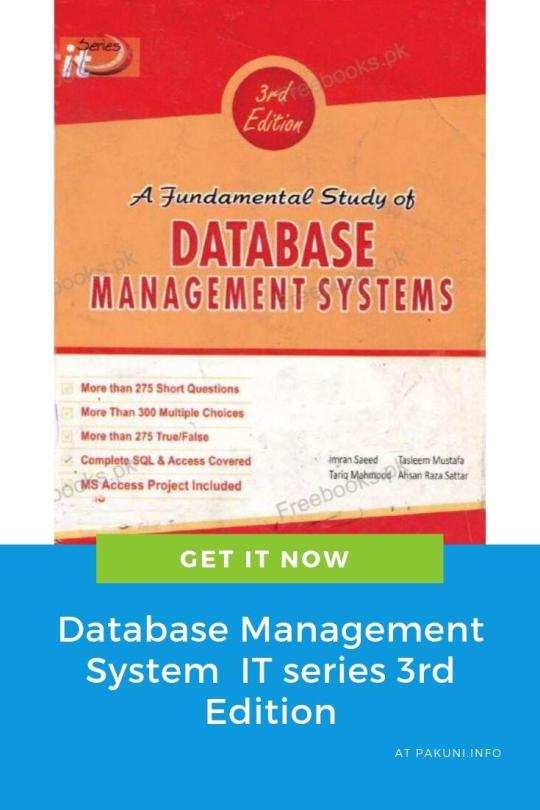
DOWNLOAD DBMS pdf book free
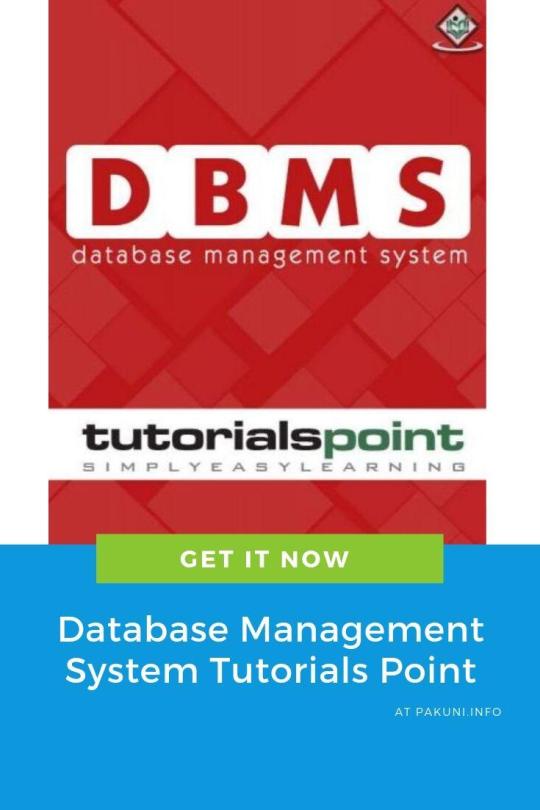
DOWNLOAD fundamentals of DBMS
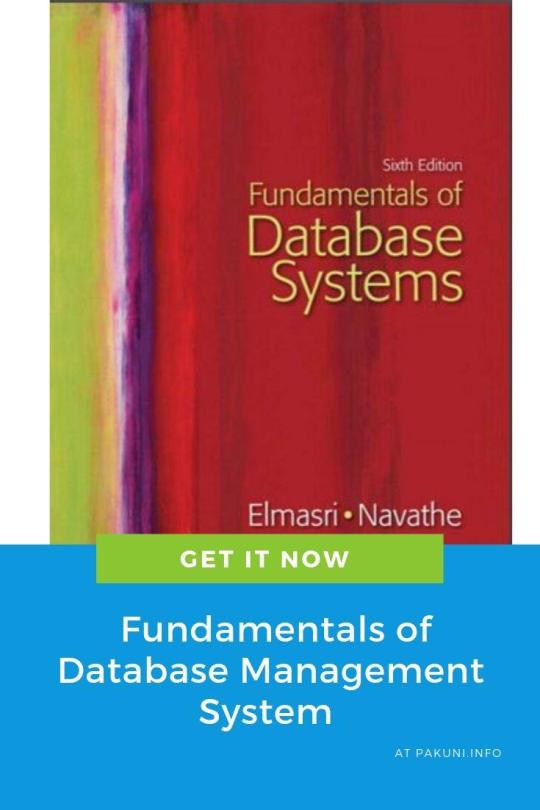
DOWNLOAD
Database management system Video Tutorials
DBMS Complete tutorial for beginners Introduction to database management system (Complete) Best DBMS complete tutorial(urdu/hindi)
Get Access to Paid Introduction to DBMS Courses and Books exclusive on Amazon, Khan Academy, Scribd, Coursea, Bightthink, EDX and BrightStorm
Check out on Amazon Store Check out on Khan Academy Check out on COURSEA Check out on Bright Storm Check out on Edx.com Read and Learn More about on BIGTHINK Get more Details about Bachelor's Degree Courses Here. These Course contents belong to HEC outline for this specific Subject. If you have any further inquiries, Please Contact US for details via mail. All the data is extracted from HEC official website. The basic purpose for this to find all course subjects data on one page. Read the full article
0 notes
Text
best database management system PDF Notes, Books Course Data and Tutorials 2019
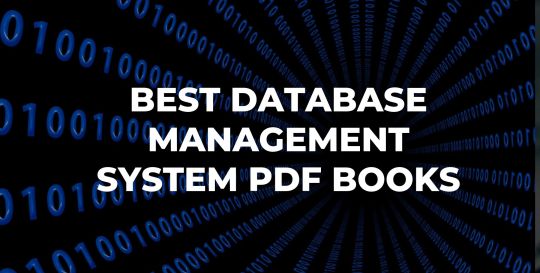
A database is an organized collection of data, generally stored and accessed electronically from a computer system. Where databases are more complex they are often developed using formal design and modeling techniques. The database management system (DBMS) is the software that interacts with end users, applications, and the database itself to capture and analyze the data. The DBMS software additionally encompasses the core facilities provided to administer the database. The sum total of the database, the DBMS and the associated applications can be referred to as a "database system". Often the term "database" is also used to loosely refer to any of the DBMS, the database system or an application associated with the database. Computer scientists may classify database-management systems according to the database models that they support. Relational databases became dominant in the 1980s. These model data as rows and columns in a series of tables, and the vast majority use SQL for writing and querying data. In the 2000s, non-relational databases became popular, referred to as NoSQL because they use different query languages. Formally, a "database" refers to a set of related data and the way it is organized. Access to this data is usually provided by a "database management system" (DBMS) consisting of an integrated set of computer software that allows users to interact with one or more databases and provides access to all of the data contained in the database (although restrictions may exist that limit access to particular data). The DBMS provides various functions that allow entry, storage and retrieval of large quantities of information and provides ways to manage how that information is organized. Because of the close relationship between them, the term "database" is often used casually to refer to both a database and the DBMS used to manipulate it. Both a database and its DBMS conform to the principles of a particular database model. "Database system" refers collectively to the database model, database management system, and database.The sizes, capabilities, and performance of databases and their respective DBMSs have grown in orders of magnitude. These performance increases were enabled by the technology progress in the areas of processors, computer memory, computer storage, and computer networks. The development of database technology can be divided into three eras based on data model or structure: navigational, SQL/relational, and post-relational. The two main early navigational data models were the hierarchical model and the CODASYL model (network model) The relational model, first proposed in 1970 by Edgar F. Codd, departed from this tradition by insisting that applications should search for data by content, rather than by following links. The relational model employs sets of ledger-style tables, each used for a different type of entity. Only in the mid-1980s did computing hardware become powerful enough to allow the wide deployment of relational systems (DBMSs plus applications). By the early 1990s, however, relational systems dominated in all large-scale data processing applications, and as of 2018 they remain dominant: IBM DB2, Oracle, MySQL, and Microsoft SQL Server are the most searched DBMS. The dominant database language, standardised SQL for the relational model, has influenced database languages for other data models. Object databases were developed in the 1980s to overcome the inconvenience of object-relational impedance mismatch, which led to the coining of the term "post-relational" and also the development of hybrid object-relational databases. The next generation of post-relational databases in the late 2000s became known as NoSQL databases, introducing fast key-value stores and document-oriented databases. A competing "next generation" known as NewSQL databases attempted new implementations that retained the relational/SQL model while aiming to match the high performance of NoSQL compared to commercially available relational DBMSs.
This Outline Will be similar with your University Course Outline for Database Management System.
Basic database concepts, database architecture, DB design life cycle, schema architecture, Conceptual, Logical and Physical database modeling and design, Mapping ERD to relational model, Functional Dependencies and Normalization, Relational Algebra , Structured Query Language (SQL), Transaction Processing, Concurrencsy Control and Recovery Techniques, Query Optimization Concepts._
Best Recommended Fundamentals of Database Management System PDF Notes and Books in Universities:
Here is detailed list of best Fundamentals of Database Management System books for Universities: database management system A Practical Approach to Design, Implementation and Management, Thomas Connolly and Carolyn Begg, Prentice Hall. Modern database management system by Fred McFadden, Jeffrey Hoofer , Mary Prescott, Prentice Hall Database Management System IT series 3rd Edition DBMS pdf book free fundamentals of DBMS DBMS Complete tutorial for beginners Introduction to database management system (Complete) Best DBMS complete tutorial(urdu/hindi)
Get Access to Paid Introduction to Economics Courses and Books exclusive on Amazon, Khan Academy, Scribd, Coursea, Bightthink, EDX and BrightStorm
Check out on Amazon Store Check out on Khan Academy Check out on COURSEA Check out on Bright Storm Check out on Edx.com Read and Learn More about on BIGTHINK Get more Details about Bachelor's Degree Courses Here. These Course contents belong to HEC outline for this specific Subject. If you have any further inquiries, Please Contact US for details via mail. All the data is extracted from HEC official website. The basic purpose for this to find all course subjects data on one page. Read the full article
0 notes
Video
youtube
SQL Tutorials | UNDERSTANDING SQL PRIMARY KEY IN URDU | PART 1
#Sql#sql tutorials#primary key#primary key in hindi#primary key in urdu#sql server#sql server tutorials#yasir fazal
0 notes
Text
Database Management System PDF Notes, Books Course Data and Tutorials
Info is an associate organized assortment of data, typically keep and accessed electronically from a computer system. wherever databases ar additional advanced they’re typically developed exploitation formal style and modeling techniques. The management system (DBMS) is the code that interacts with finish users, applications, and also the data itself to capture and analyze the knowledge. The software code, additionally , encompasses the core facilities provided to administer the data . The summation of the data , the software and also the associated applications is mentioned as a “database system”. typically the term “database” is additionally accustomed loosely ask any of the software systems, the data system or associate application associated with the data . Computer scientists might classify info-management systems keep with the database models that they support. relative databases became dominant within the 19 Eighties. These model information as rows and columns during a series of tables, and also the overwhelming majority use SQL for writing and querying information. within the 2000s, non-relational databases became widespread, mentioned as NoSQL as a results of they use totally different question languages. Formally, a “database” refers to a gaggle of connected information and also the tactic it’s organized. Access to this information is usually provided by a “database management system” (DBMS) consisting of associate integrated set of pc code that permits users to maneuver with one or additional information and provides access to all or any or any or any or any of the knowledge contained within the database (although restrictions might exist that limit access to explicit data). Because of the shut relationship between them, the term “database” is usually used nonchalantly to ask each an info and also the software familiar with manipulate it. Both a info and its software adapt to the principles of a specific info model.
History of database management system
The sizes, capabilities, and performance of databases and their several DBMSs have adult in orders of magnitude. This performance will increase were enabled by the technology progress within the fields of processors, memory devices, memory devices, and pc networks. the event of knowledge technology is split into 3 eras supported information model or structure: direction, SQL/relational, and post-relational. The two main early direction information models were the gradable model and also the CODASYL model (network model) The relative model, 1st planned in 1970 by Edgar F. Codd, departed from this tradition by the appliance that applications need to search for information by content, rather of by following links. The relative model employs sets of ledger-style tables, every used for a special quite entity. solely within the mid-1980s did computing hardware become powerful enough to allow the wide readying of relative systems (DBMSs and applications). By the primary Nineteen Nineties, but, relative systems dominated collectively large-scale processing applications, and as of 2018 they proceed to be dominant: IBM DB2, Oracle, MySQL, and Microsoft SQL The dominant info language, standardized SQL for the relative model, has influenced info languages for various information models Object databases were developed within the 19 Eighties to beat the inconvenience of object-relational electric resistance pair, that diode to the coining of the term “post-relational” and additionally the The next generation of post-relational databases within the late 2000s became named NoSQL databases, introducing quick key-value stores and document-oriented databases.
This Outline Will be similar with your University Course Outline for Database Management System.
Basic database concepts, DB design life cycle, schema architecture, database architecture, Conceptual, L Mapping ERD to relational model, ogical and Physical database modeling and design, Functional Dependencies and Normalization, Relational Algebra, Functional Dependencies and Normalization, Structured Query Language (SQL), Transaction Processing, Concurrencsy Control and Recovery Techniques, Query Optimization Concepts._
Best Recommended Fundamentals of Database Management System PDF Notes and Books in Universities:
Here is detailed list of best Fundamentals of Database Management System books for Universities: database management system A Practical Approach to Design, Implementation and Management by Thomas Connolly and Carolyn Begg Modern database management system by Fred McFadden, Jeffrey Hoofer , Mary Prescott Database Management System IT series 3rd Edition DBMS pdf book free fundamentals of DBMS DBMS Complete tutorial for beginners Introduction to database management system (Complete) Best DBMS complete tutorial(urdu/hindi)
Get Access to Paid Introduction to DBMS Courses and Books exclusive on Amazon, Khan Academy, Scribd, Coursea, Bightthink, EDX and BrightStorm
Check out on Amazon Store Check out on Khan Academy Check out on COURSEA Check out on Bright Storm Check out on Edx.com Read and Learn More about on BIGTHINK Get more Details about Bachelor's Degree Courses Here. These Course contents belong to HEC outline for this specific Subject. If you have any further inquiries, Please Contact US for details via mail. All the data is extracted from HEC official website. The basic purpose for this to find all course subjects data on one page. Read the full article
#bachelorofscienceinsoftwareengineering#BSCSBooks#BSITBooks#BSsoftwareEngineering#databasemanagementsystem#databasemanagementsystemcourse#databasemanagementsystempdfnotes#databasemanagementsystemtutorial
0 notes
Text
2019's Best Database Management System PDF Notes, Books Course Data and Tutorials
A database is an organized collection of data, generally stored and accessed electronically from a computer system. Where databases are more complex they are often developed using formal design and modeling techniques. The database management system (DBMS) is the software that interacts with end users, applications, and the database itself to capture and analyze the data. The DBMS software additionally encompasses the core facilities provided to administer the database. The sum total of the database, the DBMS and the associated applications can be referred to as a "database system". Often the term "database" is also used to loosely refer to any of the DBMS, the database system or an application associated with the database. Computer scientists may classify database-management systems according to the database models that they support. Relational databases became dominant in the 1980s. These model data as rows and columns in a series of tables, and the vast majority use SQL for writing and querying data. In the 2000s, non-relational databases became popular, referred to as NoSQL because they use different query languages. Formally, a "database" refers to a set of related data and the way it is organized. Access to this data is usually provided by a "database management system" (DBMS) consisting of an integrated set of computer software that allows users to interact with one or more databases and provides access to all of the data contained in the database (although restrictions may exist that limit access to particular data). The DBMS provides various functions that allow entry, storage and retrieval of large quantities of information and provides ways to manage how that information is organized. Because of the close relationship between them, the term "database" is often used casually to refer to both a database and the DBMS used to manipulate it. Both a database and its DBMS conform to the principles of a particular database model. "Database system" refers collectively to the database model, database management system, and database.The sizes, capabilities, and performance of databases and their respective DBMSs have grown in orders of magnitude. These performance increases were enabled by the technology progress in the areas of processors, computer memory, computer storage, and computer networks. The development of database technology can be divided into three eras based on data model or structure: navigational, SQL/relational, and post-relational. The two main early navigational data models were the hierarchical model and the CODASYL model (network model) The relational model, first proposed in 1970 by Edgar F. Codd, departed from this tradition by insisting that applications should search for data by content, rather than by following links. The relational model employs sets of ledger-style tables, each used for a different type of entity. Only in the mid-1980s did computing hardware become powerful enough to allow the wide deployment of relational systems (DBMSs plus applications). By the early 1990s, however, relational systems dominated in all large-scale data processing applications, and as of 2018 they remain dominant: IBM DB2, Oracle, MySQL, and Microsoft SQL Server are the most searched DBMS. The dominant database language, standardised SQL for the relational model, has influenced database languages for other data models. Object databases were developed in the 1980s to overcome the inconvenience of object-relational impedance mismatch, which led to the coining of the term "post-relational" and also the development of hybrid object-relational databases. The next generation of post-relational databases in the late 2000s became known as NoSQL databases, introducing fast key-value stores and document-oriented databases. A competing "next generation" known as NewSQL databases attempted new implementations that retained the relational/SQL model while aiming to match the high performance of NoSQL compared to commercially available relational DBMSs.
This Outline Will be similar with your University Course Outline for Database Management System.
Basic database concepts, database architecture, DB design life cycle, schema architecture, Conceptual, Logical and Physical database modeling and design, Mapping ERD to relational model, Functional Dependencies and Normalization, Relational Algebra , Structured Query Language (SQL), Transaction Processing, Concurrencsy Control and Recovery Techniques, Query Optimization Concepts._
Best Recommended Fundamentals of Database Management System PDF Notes and Books in Universities:
Here is detailed list of best Fundamentals of Database Management System books for Universities: database management system A Practical Approach to Design, Implementation and Management, Thomas Connolly and Carolyn Begg, Prentice Hall. Modern database management system by Fred McFadden, Jeffrey Hoofer , Mary Prescott, Prentice Hall Database Management System IT series 3rd Edition DBMS pdf book free fundamentals of DBMS DBMS Complete tutorial for beginners Introduction to database management system (Complete) Best DBMS complete tutorial(urdu/hindi)
Get Access to Paid Introduction to DBMS Courses and Books exclusive on Amazon, Khan Academy, Scribd, Coursea, Bightthink, EDX and BrightStorm
Check out on Amazon Store Check out on Khan Academy Check out on COURSEA Check out on Bright Storm Check out on Edx.com Read and Learn More about on BIGTHINK Get more Details about Bachelor's Degree Courses Here. These Course contents belong to HEC outline for this specific Subject. If you have any further inquiries, Please Contact US for details via mail. All the data is extracted from HEC official website. The basic purpose for this to find all course subjects data on one page. Read the full article
#bachelorofscienceinsoftwareengineering#BSCSBooks#BSITBooks#BSsoftwareEngineering#databasemanagementsystem#databasemanagementsystemcourse#databasemanagementsystempdfnotes#databasemanagementsystemtutorial
0 notes